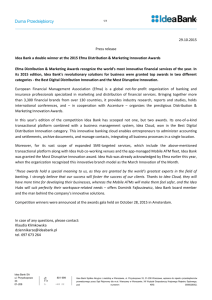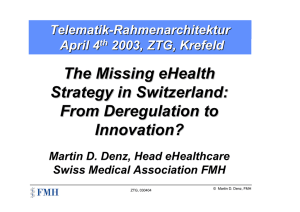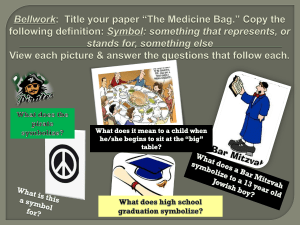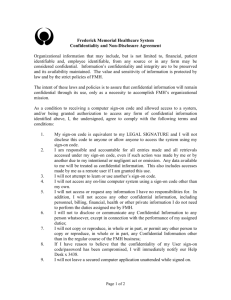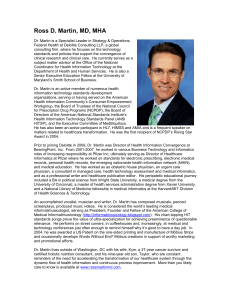Telemedicine in Daily Clinical Work Now? Tomorrow? EFMA / WHO
advertisement
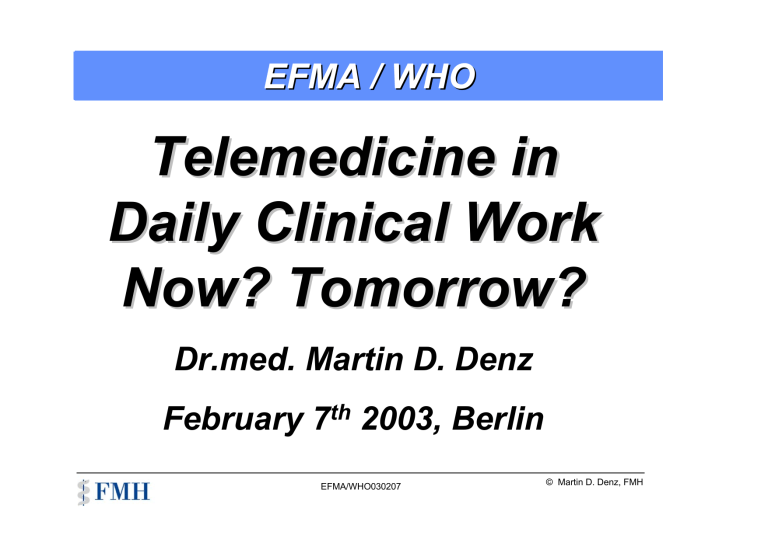
Titel1 EFMA / WHO Telemedicine in Daily Clinical Work Now? Tomorrow? Dr.med. Martin D. Denz February 7th 2003, Berlin EFMA/WHO030207 © Martin D. Denz, FMH Back to the future Titel1 • 1843 Telegraph Samuel Morse • 1876 Telephone Alexander Graham Bell • 1881 Telephone Company Zürich: first private clients • 1936 Swiss telephone subscribers use their phone for 3 calls per day EFMA/WHO030207 © Martin D. Denz, FMH The Lancet, Titel1 1879 EFMA/WHO030207 © Martin D. Denz, FMH NothingTitel1 new on earth • July 10th 1962 telecommunication satellite "Telstar" • Michael E. De Bakey revolutionizing openheart surgery • Live transmissions of his operations by television using "Telstar" as a relay EFMA/WHO030207 © Martin D. Denz, FMH Arguments: now and then Titel1 • Contra: impoverished communication, fostering social isolation, loss of culture. • Pro: "Fern-Sprecher" will be useful for long distances and emergencies. • Facts: Phone is a "Nah-Sprecher", mainly used for calls within a narrow geographical radius, to members of the closer social surroundings. EFMA/WHO030207 © Martin D. Denz, FMH Today'sTitel1 background Discontinuous processes, redundancy and discoordination of medical and caregiving processes stand for a worldwide cost factor. Our vision: integration of ICT will decisively contribute to the optimization of processes in healthcare. EFMA/WHO030207 © Martin D. Denz, FMH Redundancy Titel1 20% of B-mode sonograms, CT or MRI scans are double examinations. 19,6 % ultrasonographic, CT, or MR examinations of the same organ system had been carried out during the last 4 weeks without evidence of any clinical changes. Krug et al.: Röfo Fortschr Geb Röntgenstrahlen Bildgeb Verfahr 2002 + 2000 EFMA/WHO030207 © Martin D. Denz, FMH Costs of Disorganisation Titel1 Swiss healthcare system costs CHF 45 Mia / year Theoretical potential of optimization 10-20% ≥ CHF 8 Mia / year EFMA/WHO030207 © Martin D. Denz, FMH "Classical" Titel1 Telemedicine (1) • Tele-pathology • Tele-Radiology • Tele-Dermatology • Tele-Consulting • Tele-Teaching Primary focus: expert-centric Goal: diagnostics Content: visualisation of data EFMA/WHO030207 © Martin D. Denz, FMH "Classical" Titel1 Telemedicine (2) • Potential: high quality level of clinical work • Strength: focussed on structurable aspects, transfer of medical data over a distance • Weakness: lack of integration into patients' process, lack of critical evaluation, projects do not survive grants' funding end, no transition of knowledge to other clinicians. Few systems seem to have a real consumer, user or outcome focus. There is no good evidence that telemedicine is a cost effective means of delivering health care. Whitten P et al.: BMJ 2002;324:1434–7 EFMA/WHO030207 © Martin D. Denz, FMH "ExtendedTitel1 " Telemedicine Primary focus: Public Health, Managed Care Goal: Optimization of administration and delivery of healthcare, continuous support Potential: Point of care at home, case and disease management, medical networks • Tele-Health • Tele-Homecare • Tele-(Bio)Monitoring • Tele-Reminding Weakness: Perception as insurance driven activity, poor funding in fee for service systems (incentives!) EFMA/WHO030207 © Martin D. Denz, FMH Zunahme Chronicchronischer diseases Erkrankungen Titel1, polymorbidity British Medical Journal 26 October 2002 Chronic diseases in a changing world Source: Harvard Public School of Health's project on the global burden of disease EFMA/WHO030207 © Martin D. Denz, FMH "Patient-oriented " Telemedicine (1) Titel1 Primary focus: Internet, communication, patients' and consumers' needs, quality of services, coordination of healthcare. Goals: Ubiquitous acces to information, quality and transparency of information, data and knowledge management, privacy. • Patient empowerment, shift of data-ownership • Patients' and health profs' cards, networks, decentralised and mobile communication • New services, e.g. virtual patient record • Disease management, contact centers EFMA/WHO030207 © Martin D. Denz, FMH "Patient-oriented " Telemedicine (2) Titel1 Potential: Optimization of processes, organizational development, ICT as enabling technologies for change management in healthcare systems. Weakness: eBusiness-hype as legacy, disadvantaging of cross-border and trans-disciplinary approach, transaction-oriented business model versus financial incentives based on health preservation, lack of integrated concepts. EFMA/WHO030207 © Martin D. Denz, FMH Patient Empowerment Titel1 Shift from expert-centered to patient-centered healthcare • "knowledge sharing" • "comprehensible knowledge" • "shared decision making" • "informational self-determination" • quality-based choice of docs + hospitals EFMA/WHO030207 © Martin D. Denz, FMH Doctor Empowerment Titel1 Two future roles of physicians The "classical" general practitioner • curing illness-sequences The "managing" general practitioner • partner, companion, enabler • process coordinator, guide • pilot, knowledge navigator • life-time health coach EFMA/WHO030207 © Martin D. Denz, FMH Shift electronic medical record… Titel1 • EMR is NOT a paper record in a computer • Increases quality and amount of available data, quality of care • Permits additional functionality • Reduces uncertainty • Contributes to medical knowledge and efficiency EFMA/WHO030207 © Martin D. Denz, FMH …towards integrated Titel1 practice systems • Support of care and patients' process coordination • Increased availability – Storage and retrieval of medical records – By more providers or collaborative treatment (networks) • Support of medical procedures – – – – • • • • Context-sensitive decision support and ePrescribing Facilitating communication with and information of patients Preventive medicine, monitoring, continuous support Practice- and reality-based medicine ("real" EBM!) Support of administrative tasks (coding, accounting) Quality control and economical self-controlling Vehicle for research and education ("instant" CME) Registration tool for policy making (parity of data) EFMA/WHO030207 © Martin D. Denz, FMH What skills are needed? Titel1 EFMA/WHO030207 © Martin D. Denz, FMH Basical cultural Titel1techniques The incorporation of information and communication technologies (ICT) into our society and particularly into healthcare requires new cultural techniques. Skills in using ICT will be as fundamental and invaluable as the three "r's" of reading, writing and arithmetic. EFMA/WHO030207 © Martin D. Denz, FMH It's up to you! Titel1 ...how to use Telemedicine (ICT) in daily practice ...to develop apropriate usage and skills Technology is never the solution – use technology as means to an end! EFMA/WHO030207 © Martin D. Denz, FMH
